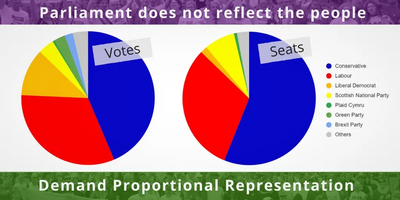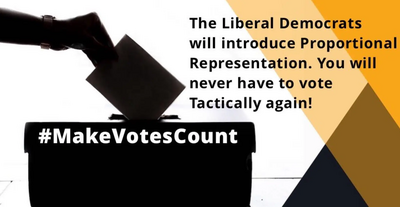Johnson's flagrant disregard for the rule of law must signal the end for FPTP
If anyone had any doubts about the need for PR for Westminster Elections then Johnson's flagrant disregard for the rule of law must tip the balance.
Having been proven to have illegally suspended Parliament, Johnson and his supine cabinet of incompetents are now set course on the ultimate No Deal Brexit blame game. Bring forth a Bill to drive a coach and horses through the UK/ EU Withdrawal Agreement, threaten to breach international law, cause maximum chaos and hope that the EU will unilaterally disengage from trade talks.
This is the individual who having secured a thumping Tory majority with his 'oven ready, 'get Brexit Done' slogans, signed the Withdrawal Agreement and now hopes that the Covid-19 pandemic will cover up the impending fallout from an increasingly likely No Deal Brexit on 1st January 2021.
The proponents of First Passed the Post (FPTP) Westminster elections have always claimed that the current system ensures strong Government. Proportional voting was for 'the others' across the Channel with their love of coalitions. With First Past the Post, minority rule is the norm. For about 90% of the time since 1935 we've had single-party 'majority' governments, but not one of them had the support of a majority of voters.
Well, the Covid-19 pandemic, which has certainly demanded strong, competent Government, has in essence resulted in endless unmet promises, vacillation, u-turns, and always a readiness to blame others when things go wrong.
The rest of us shouldn't be surprised therefore that Boris Johnson, with his 'oven ready' promises and a compliant majority secure for four more years is willing to flout international laws. It is little wonder that some Tory MP's and Peers, having signed the Boris' Brexit Pledge are having their 'Victor Meldrew moments'.
So what did our wonderful FPTP electoral system throw up this time?

In the 2019 general election, the Liberal Democrats (11.5%), Green Party and Brexit Party received 16% (5.2 million) of votes between them, yet they shared just 2% of seats.
The Liberal Democrats were particularly disadvantaged by FPTP, losing a seat despite increasing their overall vote share by 4%.
The Conservatives currently hold a majority of seats with just 43.6% of the votes. In the 2019 election they gained an extra 48 seats despite an increase of only 1.2% of the vote share.
Make Votes Matter say: Almost since the first general election, politicians who most of us didn't vote for and don't agree with have had the power to govern the UK however they like. First Past the Post continuously makes us live under Governments we rejected... A First Past the Post, Parliament does not reflect the way we vote. It denies millions of people representation of their choosing. Many of us have never seen the party we vote for get the seats it has earned. If we do nothing about it, this will keep on happening, again and again, for the rest of our live...
Proportional Representation means majority rule, not minority rule. With PR, any government must have a majority of votes behind it - so in order to govern, a party needs to either work collaboratively with other parties, or persuade most of us to vote for it.

Note:
The new Internal Markets Bill apparently sets out rules for the operation of the UK internal market - trade between England, Scotland, Wales and Northern Ireland - after the end of the Brexit transition period. It explicitly states that the new powers apply even if they are incompatible with international law.
It proposes: No new checks on goods moving from N. Ireland to the rest of Great Britain. Giving UK ministers powers to modify or "dis-apply" rules relating to the movement of goods that will come into force from 1 January if the UK and EU are unable to reach an alternative agreement through a trade deal and powers to override previously agreed obligations on state aid.
Sources:

END
